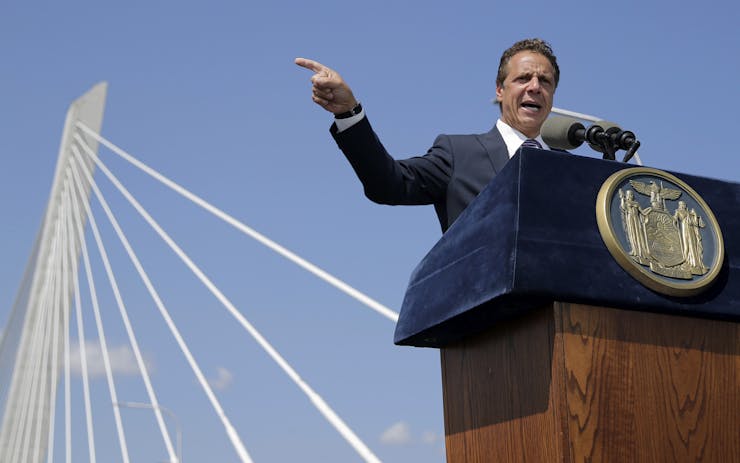One of the nation’s most powerful, prosperous, and populous states is laying the groundwork to end cannabis prohibition.
On Friday, July 13, New York State Health Commissioner Howard Zucker released a 75-page Marijuana Legalization Impact Assessment, concluding that “the positive effects of a regulated marijuana market in [New York State] outweigh the potential negative impacts.”
Drawing on findings from nine other legal-cannabis states as well as medical marijuana in 29 states, the assessment made about a dozen sweeping conclusions that advance the argument for cannabis regulation and taxation in the Empire State. Among them:
- “Marijuana regulation could generate long-term cost savings.”
- “Changes in overall patterns of use are not likely to be significant.”
- “The majority of credible evidence suggests legalization of marijuana has no or minimal impact on use by youth.”
- “Regulating marijuana reduces risks and improves quality control and consumer protection.”
- “There has been no increase in violent crime or property crime rates around medical marijuana dispensaries.”
- “Marijuana may reduce opioid deaths and opioid prescribing.”
- “Marijuana has intrinsic health benefits and risks.”
- “There is little evidence that marijuana use is significantly or causally associated with more common mental illnesses (such as mild-tomoderate depression or anxiety) or other adverse outcomes (such as suicide) in the general population.”
Differing Opinions, Same Facts
New York has almost 60,000 patients enrolled in its medical marijuana program who so far have experienced just 27 reported adverse effects and no reported deaths, Zucker found.
The assessment, ordered by Gov. Andrew Cuomo in January, will act as a common set of facts lawmakers can draw from during a potential 2019 legalization drive in the state Legislature, said Chris Alexander, policy coordinator for the New York office of the Drug Policy Alliance. That group worked to pass decriminalization as well as medical marijuana measures in New York, which does not allow citizen initiatives.
“It refutes misinformation about what’s happening in other legal states with regard to underage use, traffic fatalities, mental health impacts, and all that stuff. The report is going to make sure when we get to the point where we’re ready to talk about this, we have the same facts,” he said.
The report has historical echoes, too. New York state health officials recommended against cannabis prohibition in the now-prescient LaGuardia Report — which came out in 1939, just as prohibition was gaining speed.
With legalization polling at more than 60% in New York, real reform could happen not in five years, but beginning in January when the Legislature reconvenes.
“Next year is feeling more and more real,” Alexander said.
New York State might have a $3.5 billion cannabis underground market, the assessment found. Legalizing the botanical drug could generate anywhere from $248 million to $667 million per year in tax revenue, it concluded.
Shop highly rated dispensaries near you
Showing you dispensaries nearClarity on Drugged Driving
The report also adds some much-needed clarity on the issue of drugged driving, finding that:
“Conclusions cannot be drawn from the existing research on the impact of marijuana use on motor vehicle traffic crashes. … However, three years after the legalization of regulated marijuana in Colorado, motor vehicle crash rates overall were not statistically different, although this evidence is still preliminary. … A study comparing motor vehicle-related fatalities in Washington and Colorado to eight similar states found that three years after marijuana legalization, changes in motor vehicle fatality rates were not statistically different from those in similar states without regulated marijuana.”
The report notes that the lack of historical data makes definitive conclusions unreliable.
“Few states collected pre-legalization baseline data to use as a comparator for evaluation purposes. States that have regulated marijuana have an inability to conclusively state the role that marijuana has played in traffic safety. Data from the National Highway Transportation Administration’s Fatality Analysis Reporting System on crashes contain the caveats that they cannot be reliably compared across or within jurisdictions or across years.”
And the report makes clear that having cannabis byproducts in one’s blood does not make that person impaired.
“The National Highway Traffic Safety Administration and the AAA Foundation for Traffic Safety have both made the distinction that unlike alcohol, presence of THC in an individual’s blood stream does not equate to impairment.”
Weed War A Minority War
The report also notes cannabis prohibition’s toll on the citizens it’s designed to protect, particularly black communities and other people of color.
“Criminalization of marijuana has not curbed marijuana use despite the commitment of significant law enforcement resources,” the report states. “Marijuana prohibition results in disproportionate criminalization of certain racial and ethnic groups.”
Nine out of 10 New York City marijuana arrests are of black and Latino individuals, despite similar usage rates among all races, Alexander said.
The report seems destined to help Cuomo continue evolving on the issue of cannabis policy, he said. The governor had been a leader on decriminalization since 2012. But as recently as last year, he said cannabis might be a gateway drug to heroin.
Gubernatorial candidate Cynthia Nixon attacked Cuomo on the left for not moving fast enough to unwind the war on weed, which Alexander said could have pushed Cuomo to speed up.
“He was already moving on this issue. If anything, she might have accelerated [Gov. Cuomo’s] timeline,” he said.





